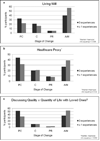Association of experience with illness and end-of-life care with advance care planning in older adults
- PMID: 24934237
- PMCID: PMC4107022
- DOI: 10.1111/jgs.12894
Association of experience with illness and end-of-life care with advance care planning in older adults
Abstract
Objectives: To examine whether experiences with illness and end-of-life care are associated with readiness to participate in advance care planning (ACP).
Design: Observational cohort study.
Setting: Community.
Participants: Persons aged 60 and older recruited from physician offices and a senior center.
Measurements: Participants were asked about personal experience with major illness or surgery and experience with others' end-of-life care, including whether they had made a medical decision for someone dying, knew someone who had a bad death due to too much or too little medical care, or experienced the death of a loved one who made end-of-life wishes known. Stages of change were assessed for specific ACP behaviors: completion of living will and healthcare proxy, communication with loved ones regarding life-sustaining treatments and quantity versus quality of life, and communication with physicians about these same topics. Stages of change included precontemplation, contemplation, preparation, and action or maintenance, corresponding to whether the participant was not ready to complete the behavior, was considering participation in the next 6 months, was planning participation within 30 days, or had already participated.
Results: Of 304 participants, 84% had one or more personal experiences or experience with others. Personal experiences were not associated with greater readiness for most ACP behaviors. In contrast, having one or more experiences with others was associated with greater readiness to complete a living will and healthcare proxy, discuss life-sustaining treatment with loved ones, and discuss quantity versus quality of life with loved ones and with physicians.
Conclusion: Older individuals who have experience with end-of-life care of others demonstrate greater readiness to participate in ACP. Discussions with older adults regarding these experiences may be a useful tool in promoting ACP.
Keywords: advance care planning; end-of-life care.
© 2014, Copyright the Authors Journal compilation © 2014, The American Geriatrics Society.
Conflict of interest statement
Figures


Comment in
-
Learning from experience and making plans?J Am Geriatr Soc. 2015 Jan;63(1):204. doi: 10.1111/jgs.13220. J Am Geriatr Soc. 2015. PMID: 25597587 No abstract available.
Similar articles
-
Stages of change for the component behaviors of advance care planning.J Am Geriatr Soc. 2010 Dec;58(12):2329-36. doi: 10.1111/j.1532-5415.2010.03184.x. J Am Geriatr Soc. 2010. PMID: 21143441 Free PMC article.
-
Can Playing an End-of-Life Conversation Game Motivate People to Engage in Advance Care Planning?Am J Hosp Palliat Care. 2017 Sep;34(8):754-761. doi: 10.1177/1049909116656353. Epub 2016 Jul 12. Am J Hosp Palliat Care. 2017. PMID: 27406696 Free PMC article.
-
The advance care planning PREPARE study among older Veterans with serious and chronic illness: study protocol for a randomized controlled trial.Trials. 2015 Dec 12;16:570. doi: 10.1186/s13063-015-1055-9. Trials. 2015. PMID: 26654250 Free PMC article. Clinical Trial.
-
Effects of advance care planning on end-of-life decisions among community-dwelling elderly people and their relatives: a systematic review and meta-analysis.Ann Palliat Med. 2023 May;12(3):571-583. doi: 10.21037/apm-23-367. Ann Palliat Med. 2023. PMID: 37272020
-
Advance care planning readiness among community-dwelling older adults and the influencing factors: a scoping review.BMC Palliat Care. 2024 Nov 4;23(1):255. doi: 10.1186/s12904-024-01583-4. BMC Palliat Care. 2024. PMID: 39491026 Free PMC article.
Cited by
-
Factors Associated with Advance Directives Documentation: A Nationwide Cross-Sectional Survey of Older Adults in Korea.Int J Environ Res Public Health. 2022 Mar 22;19(7):3771. doi: 10.3390/ijerph19073771. Int J Environ Res Public Health. 2022. PMID: 35409452 Free PMC article.
-
Engagement in Non-Medical End-of-Life Planning by Older Adults.J Pain Symptom Manage. 2021 Oct;62(4):805-812. doi: 10.1016/j.jpainsymman.2021.03.003. Epub 2021 Mar 12. J Pain Symptom Manage. 2021. PMID: 33716035 Free PMC article.
-
Advance care planning uptake among patients with severe lung disease: a randomised patient preference trial of a nurse-led, facilitated advance care planning intervention.BMJ Open. 2017 Feb 24;7(2):e013415. doi: 10.1136/bmjopen-2016-013415. BMJ Open. 2017. PMID: 28237955 Free PMC article. Clinical Trial.
-
Understanding the Role of Knowledge in Advance Care Planning Engagement.J Pain Symptom Manage. 2021 Oct;62(4):778-784. doi: 10.1016/j.jpainsymman.2021.02.011. Epub 2021 Feb 13. J Pain Symptom Manage. 2021. PMID: 33587993 Free PMC article. Clinical Trial.
-
Opinions of Older Individuals on Advance Care Planning and Factors Affecting Their Views: A Systematic Review.Int J Environ Res Public Health. 2023 May 10;20(10):5780. doi: 10.3390/ijerph20105780. Int J Environ Res Public Health. 2023. PMID: 37239509 Free PMC article.
References
-
- Gillick MR. Advance care planning. N Engl J Med. 2004;350:7–8. - PubMed
Publication types
MeSH terms
Grants and funding
LinkOut - more resources
Full Text Sources
Other Literature Sources
Research Materials

